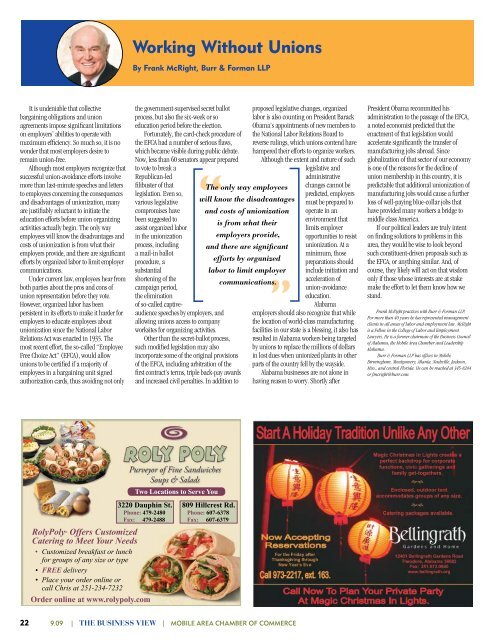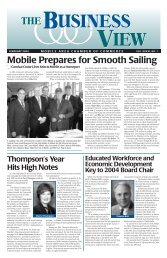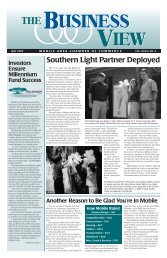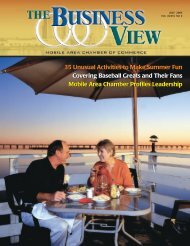3-09 B VIEW - Mobile Chamber of Commerce
3-09 B VIEW - Mobile Chamber of Commerce
3-09 B VIEW - Mobile Chamber of Commerce
Create successful ePaper yourself
Turn your PDF publications into a flip-book with our unique Google optimized e-Paper software.
It is undeniable that collective<br />
bargaining obligations and union<br />
agreements impose significant limitations<br />
on employers’ abilities to operate with<br />
maximum efficiency. So much so, it is no<br />
wonder that most employers desire to<br />
remain union-free.<br />
Although most employers recognize that<br />
successful union-avoidance efforts involve<br />
more than last-minute speeches and letters<br />
to employees concerning the consequences<br />
and disadvantages <strong>of</strong> unionization, many<br />
are justifiably reluctant to initiate the<br />
education efforts before union organizing<br />
activities actually begin. The only way<br />
employees will know the disadvantages and<br />
costs <strong>of</strong> unionization is from what their<br />
employers provide, and there are significant<br />
efforts by organized labor to limit employer<br />
communications.<br />
Under current law, employees hear from<br />
both parties about the pros and cons <strong>of</strong><br />
union representation before they vote.<br />
However, organized labor has been<br />
persistent in its efforts to make it harder for<br />
employers to educate employees about<br />
unionization since the National Labor<br />
Relations Act was enacted in 1935. The<br />
most recent effort, the so-called “Employee<br />
Free Choice Act” (EFCA), would allow<br />
unions to be certified if a majority <strong>of</strong><br />
employees in a bargaining unit signed<br />
authorization cards, thus avoiding not only<br />
RolyPoly ® 3220 Dauphin St.<br />
Phone: 479-2480<br />
Fax: 479-2488<br />
Offers Customized<br />
Catering to Meet Your Needs<br />
• Customized breakfast or lunch<br />
for groups <strong>of</strong> any size or type<br />
• FREE delivery<br />
• Place your order online or<br />
call Chris at 251-234-7232<br />
Order online at www.rolypoly.com<br />
Working Without Unions<br />
By Frank McRight, Burr & Forman LLP<br />
the government-supervised secret ballot<br />
process, but also the six-week or so<br />
education period before the election.<br />
Fortunately, the card-check procedure <strong>of</strong><br />
the EFCA had a number <strong>of</strong> serious flaws,<br />
which became visible during public debate.<br />
Now, less than 60 senators appear prepared<br />
to vote to break a<br />
Republican-led<br />
filibuster <strong>of</strong> that<br />
legislation. Even so,<br />
various legislative<br />
compromises have<br />
been suggested to<br />
assist organized labor<br />
in the unionization<br />
process, including<br />
a mail-in ballot<br />
procedure, a<br />
substantial<br />
shortening <strong>of</strong> the<br />
campaign period,<br />
the elimination<br />
<strong>of</strong> so-called captiveaudience<br />
speeches by employers, and<br />
allowing unions access to company<br />
worksites for organizing activities.<br />
Other than the secret-ballot process,<br />
such modified legislation may also<br />
incorporate some <strong>of</strong> the original provisions<br />
<strong>of</strong> the EFCA, including arbitration <strong>of</strong> the<br />
first contract’s terms, triple back-pay awards<br />
and increased civil penalties. In addition to<br />
Two Locations to Serve You<br />
The only way employees<br />
will know the disadvantages<br />
and costs <strong>of</strong> unionization<br />
is from what their<br />
employers provide,<br />
and there are significant<br />
efforts by organized<br />
labor to limit employer<br />
8<strong>09</strong> Hillcrest Rd.<br />
Phone: 607-6378<br />
Fax: 607-6379<br />
communications.<br />
22 9.<strong>09</strong> | The Business View | MoBiLE AREA ChAMBER <strong>of</strong> CoMMERCE<br />
proposed legislative changes, organized<br />
labor is also counting on President Barack<br />
Obama’s appointments <strong>of</strong> new members to<br />
the National Labor Relations Board to<br />
reverse rulings, which unions contend have<br />
hampered their efforts to organize workers.<br />
Although the extent and nature <strong>of</strong> such<br />
legislative and<br />
administrative<br />
changes cannot be<br />
predicted, employers<br />
must be prepared to<br />
operate in an<br />
environment that<br />
limits employer<br />
opportunities to resist<br />
unionization. At a<br />
minimum, those<br />
preparations should<br />
include initiation and<br />
acceleration <strong>of</strong><br />
union-avoidance<br />
education.<br />
Alabama<br />
employers should also recognize that while<br />
the location <strong>of</strong> world-class manufacturing<br />
facilities in our state is a blessing, it also has<br />
resulted in Alabama workers being targeted<br />
by unions to replace the millions <strong>of</strong> dollars<br />
in lost dues when unionized plants in other<br />
parts <strong>of</strong> the country fell by the wayside.<br />
Alabama businesses are not alone in<br />
having reason to worry. Shortly after<br />
President Obama recommitted his<br />
administration to the passage <strong>of</strong> the EFCA,<br />
a noted economist predicted that the<br />
enactment <strong>of</strong> that legislation would<br />
accelerate significantly the transfer <strong>of</strong><br />
manufacturing jobs abroad. Since<br />
globalization <strong>of</strong> that sector <strong>of</strong> our economy<br />
is one <strong>of</strong> the reasons for the decline <strong>of</strong><br />
union membership in this country, it is<br />
predictable that additional unionization <strong>of</strong><br />
manufacturing jobs would cause a further<br />
loss <strong>of</strong> well-paying blue-collar jobs that<br />
have provided many workers a bridge to<br />
middle class America.<br />
If our political leaders are truly intent<br />
on finding solutions to problems in this<br />
area, they would be wise to look beyond<br />
such constituent-driven proposals such as<br />
the EFCA, or anything similar. And, <strong>of</strong><br />
course, they likely will act on that wisdom<br />
only if those whose interests are at stake<br />
make the effort to let them know how we<br />
stand.<br />
Frank McRight practices with Burr & Forman LLP.<br />
For more than 40 years he has represented management<br />
clients in all areas <strong>of</strong> labor and employment law. McRight<br />
is a Fellow in the College <strong>of</strong> Labor and Employment<br />
Lawyers. He is a former chairman <strong>of</strong> the Business Council<br />
<strong>of</strong> Alabama, the <strong>Mobile</strong> Area <strong>Chamber</strong> and Leadership<br />
Alabama.<br />
Burr & Forman LLP has <strong>of</strong>fices in <strong>Mobile</strong>,<br />
Birmingham, Montgomery, Atlanta, Nashville, Jackson,<br />
Miss., and central Florida. He can be reached at 345-8244<br />
or fmcright@burr.com.






